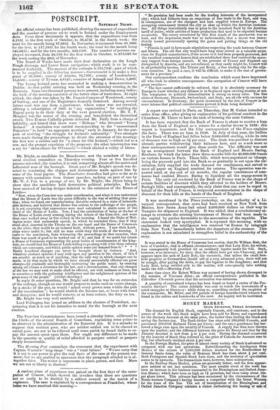A curious piece of experience was gained on the first
days of the occu- pation of Cracow, which showed the invaders that there are questions not so easily to be decided by a cabinet council as the march of a regiment. The case is explained by a correspondent at Frankfort, whose letter we have received this morning-
" No provision had been made for the trading interests of the incorporated city; which had hitherto been an emporium of free trade in the East, and was, in consequence, one of the cheapest and best supplied towns in Europe. The occupying commissary treated the city as shut up within the Austrian customs- line. All things immediately rose in price to the standard fixed by the Austrian tariff of duties, while articles of home production that used to be exported became unsaleable. The outcry occasioned by this first result of the annexation was so loud, and the impression made was so unfavourable, that a decree was imme- diately issued provisionally opening the gates and putting things on the old footing.
" Prussia is said to have made stipulations respecting the trade between Cracow and Silesia. The old free city would have long since served as a valuable empo- rium for English manufactures, if the access to it had been properly protected, and the excellent commercial houses that are established there had received the neces- sary support from foreign consuls. If the protests of France and England are disregarded by Austria, and are not enforced, as they easily might be, Cracow will in all probability become, like Trieste and Brody, a free trading city for the adja- cent countries. In such a case, it will be difficult to make it the seat of govern- ment for a province."
Our correspondent confirms the conclusion which must have impressed all who look to ulterior consequences: the occupation of Cracow will have great results- " The fact cannot sufficiently be enforced, that it is absolutely necessary for Europe to know whether any reliance is to be placed upon existing treaties or not. The temptation to political demoralization is strong on many sides. The free cities of Germany, Denmark, Switzerland, and Italy, are all life with excuses for encroachment. In Germany, the panic occasioned by the fate of Cracow is the more intense that political considerations prevent it from being declared."


































 Previous page
Previous page